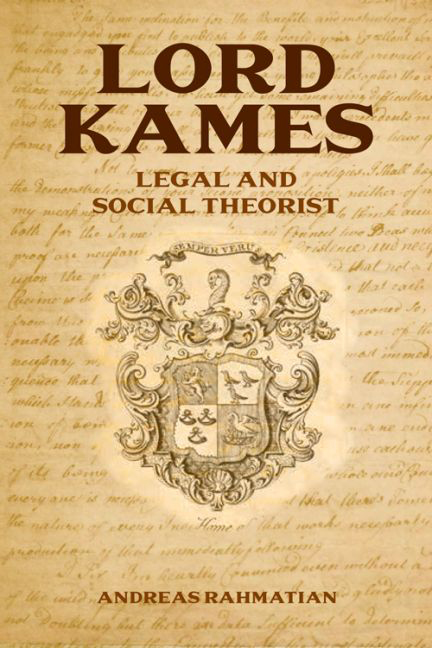Book contents
- Frontmatter
- Contents
- Preface
- Bibliography of Works by Lord Kames and Abbreviated References
- I Introduction
- II Aesthetics
- III Moral Philosophy I: Principles
- IV Moral Philosophy II: Development
- V Political Philosophy, Anthropology and Commerce
- VI Legal History, Legal Science and Comparative Law
- VII Property
- VIII Equity
- IX Obligations and Enforcement
- X Criminal Law
- XI Lord Kames's Influence on Some of the Founders of the United States
- XII A Critical Conclusion
- Bibliography
- Index
- Frontmatter
- Contents
- Preface
- Bibliography of Works by Lord Kames and Abbreviated References
- I Introduction
- II Aesthetics
- III Moral Philosophy I: Principles
- IV Moral Philosophy II: Development
- V Political Philosophy, Anthropology and Commerce
- VI Legal History, Legal Science and Comparative Law
- VII Property
- VIII Equity
- IX Obligations and Enforcement
- X Criminal Law
- XI Lord Kames's Influence on Some of the Founders of the United States
- XII A Critical Conclusion
- Bibliography
- Index
Summary
The Meanings of ‘Equity’
Equity has a distinct meaning in English law, but a far less distinct meaning in Scots law, and it denotes a specific, and to some extent idiosyncratic, legalphilosophical theory in Kames's Principles of Equity (1760). Therefore it will first be necessary to ascertain the different meanings of equity. Unlike in philosophy, anthropology and sociology, and property, Kames's discussion of equity is really confined to one work only, the Principles of Equity, which appeared in three editions in Kames's lifetime, in 1760, 1767, and 1778.
Equity in English law
Equity is a distinct body of law within English law for historical reasons. Only a few words about the history of the law of equity suffice for present purposes. From the fourteenth century onwards, the common law courts (King's Bench, Court of Common Pleas, Exchequer), already in existence under Edward I in the thirteenth century, faced a rise of the administration of ‘equity’. An increasing number of litigants petitioned the King's Chancellor, the chief administrator in the realm, for remedies which the common law could not give because it had hardened into a rigid technical system of writs. This was the idea of ‘equity’, a measure to ensure that the law is administered fairly. The Chancellor obtained a limited power of inventing new writs to grant relief in new types of cases. Initially the Chancellors did not perceive themselves as administering a body of rules different from the common law, but gradually their practice grew into what would later be considered as equitable jurisdiction. The Court of Chancery became a separate court and administrative authority of the King in the fourteenth century and a separate body of law developed, with different substantive and procedural rules, called equity. In the sixteenth century a more concrete idea of ‘rules of equity and good conscience’ as a guide in the Chancellors’ administration of justice emerged. It was also in the latter half of the sixteenth century that Chancellors were usually no longer clergymen, but lawyers.
- Type
- Chapter
- Information
- Lord KamesLegal and Social Theorist, pp. 264 - 286Publisher: Edinburgh University PressPrint publication year: 2015



